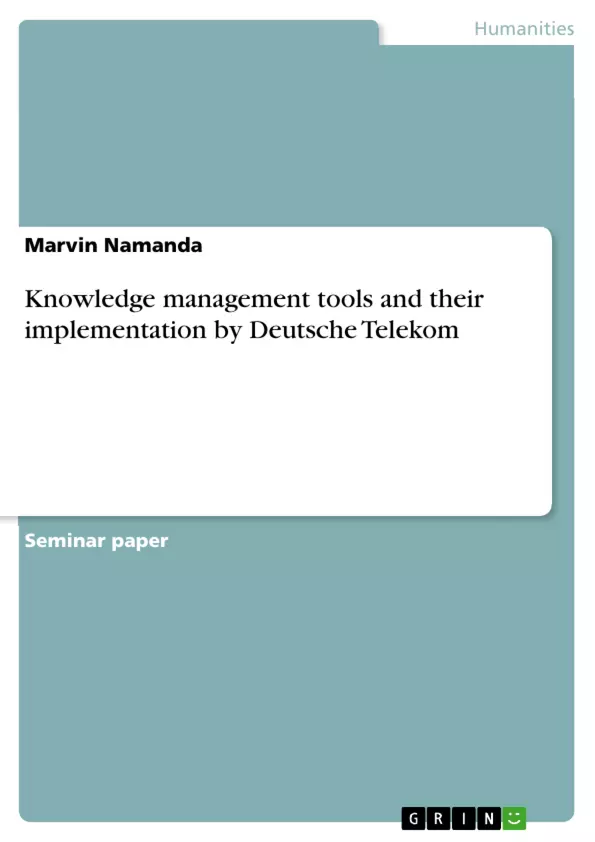This paper gives a critical discussion on the knowledge management tools and outcomes in Deutsche Telkom. More so, the paper discusses the outcomes of the implementation of these tools as compared against Choo’s KM Model.
Knowledge management is all about giving the right knowledge to the right persons for a targeted goal. Therefore, it follows that knowledge management encompasses strong ties to corporate strategy where processes are created to span organizational functions. The management of knowledge also ensures that initiatives are embraced and supported by the relevant stakeholders.
As an organizational function, knowledge management is dependent on the organizational culture in that the flexibility of the stakeholders determines the implementation and the outcomes of the knowledge management tools.
Inhaltsverzeichnis (Table of Contents)
- Abstract
- Introduction
- Literature Review
- Knowledge Management Systems
- Deutsche Telekom's Knowledge Management Tools and Techniques
- Conclusion
- References
Zielsetzung und Themenschwerpunkte (Objectives and Key Themes)
This paper critically discusses the knowledge management tools and outcomes in Deutsche Telekom. It examines the implementation of these tools and their impact on the company's success, comparing them to Choo's KM Model.
- Importance of knowledge management in organizations
- Challenges and benefits of implementing knowledge management systems
- Key characteristics of knowledge management systems
- Knowledge management tools and techniques employed by Deutsche Telekom
- The impact of knowledge management on organizational culture and performance
Zusammenfassung der Kapitel (Chapter Summaries)
- Abstract: This section provides a concise overview of the paper's focus, highlighting the importance of knowledge management in achieving organizational goals, and specifically discusses the application of knowledge management within Deutsche Telekom.
- Introduction: This chapter introduces the concept of knowledge management and its significance in modern organizations. It emphasizes the benefits of knowledge management, including learning from past experiences, improving production processes, and responding to dynamic business environments. It also discusses the core components of knowledge management, such as identification, acquisition, storage, and retrieval of knowledge.
- Literature Review: This chapter reviews existing research on knowledge management systems. It examines various perspectives on the objectives and implementation of knowledge management, highlighting key factors that influence its success, such as corporate strategy, leadership, technology, and organizational culture.
- Knowledge Management Systems: This chapter delves into the characteristics and components of knowledge management systems. It discusses the goals, processes, platforms, and services associated with these systems. The importance of integrating knowledge management into organizational processes and technology infrastructure is emphasized.
- Deutsche Telekom's Knowledge Management Tools and Techniques: This chapter examines the specific tools and techniques used by Deutsche Telekom to manage knowledge within its organization. It highlights the company's approach to knowledge retention, sharing, and growth, emphasizing the role of information technology and human resources in this process. The chapter also discusses the "expertfinder" tool, a key component of Deutsche Telekom's knowledge management strategy.
Schlüsselwörter (Keywords)
This paper focuses on knowledge management, its implementation in Deutsche Telekom, and its impact on the company's performance. Key terms and concepts explored include knowledge management systems, organizational knowledge, information technology, corporate strategy, and human resources. The paper also references and analyzes Choo's KM Model.
Frequently Asked Questions
What is the focus of knowledge management at Deutsche Telekom?
The focus is on providing the right knowledge to the right people to achieve strategic corporate goals, ensuring that initiatives are supported by stakeholders and integrated into the organizational culture.
What is the "expertfinder" tool?
"Expertfinder" is a key knowledge management tool at Deutsche Telekom designed to identify and connect employees with specific expertise across the organization to facilitate knowledge sharing.
How does organizational culture affect knowledge management?
The flexibility and willingness of stakeholders to share knowledge are critical. A culture that embraces learning and open communication is essential for the successful implementation of KM tools.
Which theoretical model is used to evaluate KM at Deutsche Telekom?
The paper compares Deutsche Telekom's KM outcomes against Choo’s Knowledge Management Model, which focuses on sense-making, knowledge creation, and decision-making.
What are the core components of a Knowledge Management System?
Core components include the identification, acquisition, storage, and retrieval of knowledge, supported by both technological platforms and human resource processes.
- Quote paper
- Marvin Namanda (Author), 2015, Knowledge management tools and their implementation by Deutsche Telekom, Munich, GRIN Verlag, https://www.hausarbeiten.de/document/317904


